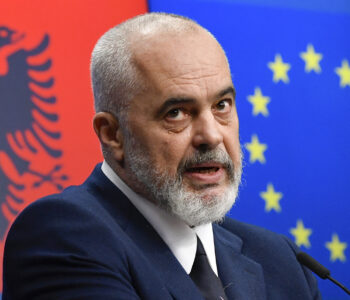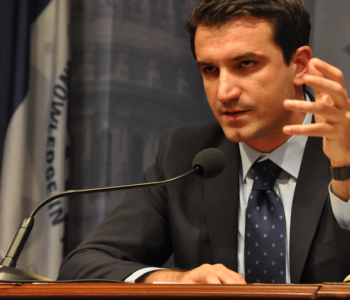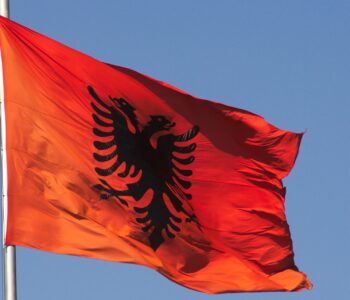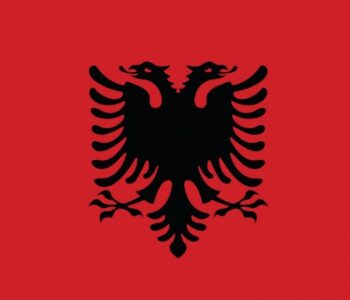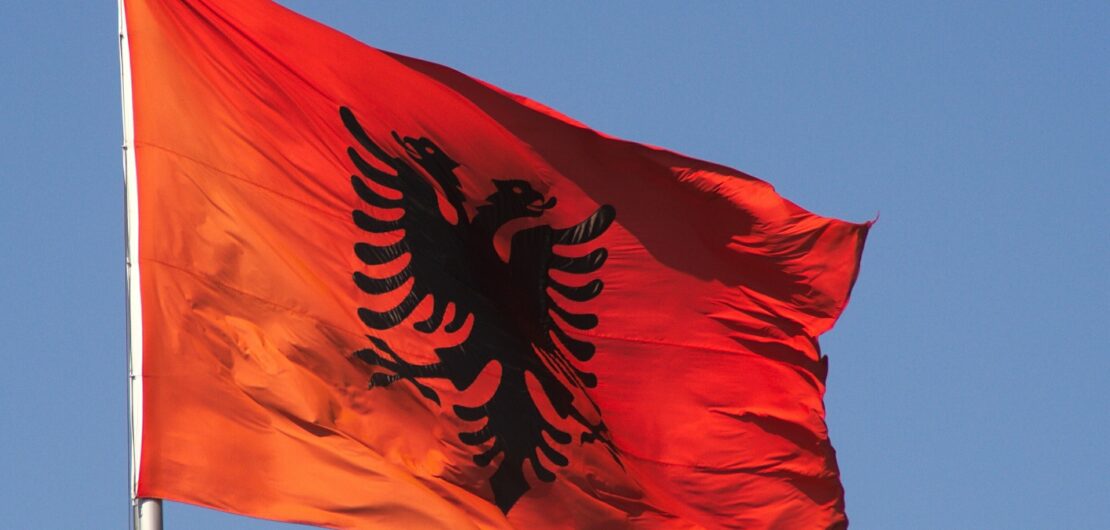 Library
Library
Albania: MFRR partners join an open letter to Prime…
Albania: MFRR partners join an open letter to Prime Minister Edi Rama
The partner organisations of the Media Freedom Rapid Response (MFRR) today join an open letter to Prime Minister Edi Rama from international press freedom groups over decision to ban journalists from press conferences.
06 July 2022
Dear Edi Rama, Prime Minister of Albania,
Endri Fuga, Director General of the Media and Information Agency
Teresa Ribeiro, OSCE Representative on Freedom of the Media
Olivér Várhelyi, EU Commissioner for Neighbourhood and Enlargement
Alexis Hupin, Chargé d’affaires at EU Delegation to Albania,
Dunja Mijatović, Council of Europe Commissioner for Human Rights
Yuri Kim, U.S. Ambassador to the Republic of Albania
Dear Prime Minister Rama,
The undersigned media freedom and freedom of expression organisations are writing to protest against your recent decision to unilaterally ban journalists from attending government press conferences and demand they undergo “re-education” after they asked challenging questions about matters of public interest.
Our organisations are concerned that these arbitrary restrictions seriously affect the ability of the press to carry out its watchdog role and seek answers about challenging issues. They are also emblematic of deeper problems regarding access to information for journalists and the obstruction of free and independent journalism in Albania, which ranks 103rd in RSF’s World Press Freedom Index, dropping annually by 20 places.
We note that during a joint press conference with Foreign Affairs Minister Olta Xhaçka on 1 July 2022, you responded to questions asked to the minister by journalist Klevin Muka of CNN affiliate A2 by telling him that he had violated the journalistic code of ethics and that he needed to undergo three months of “re-education” before he would be welcome at future press events.
In our assessment, the questions from Mr. Muka involved a legitimate matter of public interest on the recently established Code of Ethics of the Council of Ministers and potential conflicts of interest involving the minister in question, and therefore justified a response. Instead, he now faces an arbitrary three-month ban from press conferences, which will seriously affect his ability to properly carry out his professional duties.
Concerningly, we note this is not the first time a journalist has faced such a restriction. During a press conference outside the headquarters of the Socialist Party in March 2022, you told Syri.net TV journalist Ambrioza Meta that she required “re-education” and was barred from press conferences for 60 days, after she asked public interest questions about the arrest of a Socialist party MP and a corruption case linked to incinerators.
To our understanding, no formal administrative sanction exists in Albania which allows journalists to be unilaterally banned from attending government press conferences by individual politicians, even those holding executive office. It is our view therefore that the measures imposed on both Klevin Muka and Ambrioza Meta were arbitrary and unjustified.
In a democratic society, it is not the role of elected officials to personally impose disciplinary measures on individual journalists over what they consider to be alleged breaches of ethics. We therefore urge you to immediately reverse the restriction on Klevin Muka and to refrain from imposing such measures on all members of the press in the future.
Our organisations believe strongly in professionalism and integrity of the journalistic profession, for which there are important initiatives in Albania underway. However, adherence to journalistic ethics and standards should be observed and handled from within the journalistic community itself, rather than imposed by political forces.
More generally, we see these restrictions as illustrative of wider problems regarding access to information for journalists and media freedom in Albania, issues our organisations have repeatedly raised concerns about. We also note the protest organised by journalists in Tirana on 4 July 2022, which criticised the restriction as emblematic of broader efforts by political forces to dictate what questions can and cannot be asked by journalists at press conferences.
We hope to see this situation remedied as quickly as possible. Moving forward, our organisations will also continue to monitor the situation for media freedom in Albania and to push for measures which foster a better climate for independent and watchdog media. We look forward to seeing your response and welcome any opportunity for further discussion.
Signed:
Balkan Free Media Initiative
European Centre for Press and Media Freedom (ECPMF)
European Federation of Journalists (EFJ)
Free Press Unlimited (FPU)
International Press Institute (IPI)
OBC Transeuropa (OBCT)
Reporters Without Borders (RSF)
SafeJournalists Network
Lënda: Letër e hapur, Kryeministrit Edi Rama nga grupet ndërkombëtare për lirinë e shtypit për vendimin mbi ndalimin e gazetarëve nga konferencat për shtyp
Drejtuar: z. Edi Rama,
Kryeministër i Shqipërisë
Për djeni:
Endri Fuga, Drejtor i Përgjithshëm i Agjencisë së Medias dhe Informacionit
Teresa Ribeiro, Përfaqësues i OSBE-së për Lirinë e Medias
Olivér Várhelyi, Komisioner i BE-së për Fqinjësinë dhe Zgjerimin
Alexis Hupin, i Ngarkuari me Punë në Delegacionin e BE-së në Shqipëri,
Dunja Mijatovic, Komisionere e Këshillit të Evropës për të Drejtat e Njeriut
Yuri Kim, Ambasadore e SHBA-së në Republikën e Shqipërisë
I nderuar Kryeministër Rama,
Organizatat e nënshkruara për lirinë e medias dhe lirinë e shprehjes po ju shkruajnë për të shprehur shqetësimin tonë për vendimin tuaj të fundit për të ndaluar në mënyrë të njëanshme pjesëmarrjen e gazetarëve në konferencat e shtypit të qeverisë dhe për të kërkuar që ata t’i nënshtrohen “riedukimit” pasi ata drejtuan pyetje sfiduese për çështje me interes publik.
Organizatat tona janë të shqetësuara se këto kufizime arbitrare ndikojnë seriozisht në aftësinë e shtypit për të kryer rolin e tyre mbikëqyrës dhe për të kërkuar përgjigje për çështje sfiduese. Ato janë gjithashtu emblematike e problemeve më të thella në lidhje me aksesin në informacion për gazetarët dhe pengimin e gazetarisë së lirë dhe të pavarur në Shqipëri, e cila renditet e 103-ta në Indeksin Botëror të Lirisë së Shtypit të RSF-së, duke rënë çdo vit me 20 vende.
Kemi vëmë re se gjatë një konference të përbashkët për shtyp me ministren e Jashtme Olta Xhaçka, më 1 korrik 2022, ju iu përgjigjët pyetjeve të gazetarit Klevin Muka të stacionit A2 degë CNN, duke i thënë se kishte shkelur kodin e etikës gazetareske dhe se ai duhej t’i nënshtrohej tre muajsh “riedukimit” përpara se të ishte i mirëpritur në konferencat e rradhës për shtyp.
Në vlerësimin tonë, pyetjet e zotit Muka përfshinin një çështje legjitime me interes publik mbi Kodin e Etikës të Këshillit të Ministrave të sapokrijuar dhe konflikte të mundshme interesi që përfshijnë ministren në fjalë, dhe për këtë arsye justifikonin një përgjigje. Në vend të kësaj, ai tani përballet me një ndalim arbitrar prej tre muajsh nga konferencat për shtyp, gjë që do të ndikojë seriozisht në aftësinë e tij për të kryer siç duhet detyrat e tij profesionale.
Me shqetësim, theksojmë se kjo nuk është hera e parë që një gazetar përballet me një kufizim të tillë. Gjatë një konference për shtyp jashtë selisë së Partisë Socialiste në mars 2022, ju i keni thënë gazetares së TV Syri.net, Ambrioza Meta se ajo kishte nevojë për “riedukim” dhe u ndalua nga konferencat për shtyp për 60 ditë, pasi ajo bëri pyetje me interes publik për arrestimin e një deputeti të Partisë Socialiste dhe një rast korrupsioni të lidhur me inceneratorët.
Në këndvështrimin tonë, në Shqipëri nuk ekziston asnjë sanksion administrativ zyrtar që lejon që gazetarët të ndalohen në mënyrë të njëanshme të marrin pjesë në konferencat e shtypit të qeverisë nga politikanë individualisht, apo edhe ata që mbajnë poste ekzekutive. Prandaj mendojmë se masat e vendosura si ndaj Klevin Mukës ashtu edhe ndaj Ambrioza Metës ishin arbitrare dhe të pajustifikuara.
Në një shoqëri demokratike, nuk është roli i zyrtarëve të zgjedhur që të vendosin personalisht masa disiplinore ndaj gazetarëve si individ mbi ato që ata konsiderojnë – me të drejtë ose jo – si shkelje të pretenduara të etikës. Ndaj ju bëjmë thirrje që të hiqni menjëherë kufizimin ndaj Klevin Mukës dhe të përmbaheni nga vendosja e masave të tilla ndaj të gjithë anëtarëve të shtypit në të ardhmen.
Organizatat tona besojnë fort në profesionalizmin dhe integritetin e profesionit të gazetarit, për të cilin janë duke u zhvilluar nisma të rëndësishme në Shqipëri. Megjithatë, respektimi i etikës dhe standardeve gazetareske duhet të respektohet dhe trajtohet nga brenda vetë komunitetit gazetaresk, në vend që të imponohet nga forcat politike.
Për më tepër, ne i shohim këto kufizime si ilustruese të problemeve më të gjera në lidhje me aksesin në informacion për gazetarët dhe lirinë e medias në Shqipëri, çështje për të cilat organizatat tona kanë ngritur vazhdimisht shqetësime. Vëmë re gjithashtu protestën e organizuar nga gazetarët në Tiranë më 4 korrik 2022, e cila kritikoi kufizimin emblematik të përpjekjeve më të gjera të forcave politike për të diktuar se çfarë pyetjesh mund dhe nuk mund të bëhen nga gazetarët në konferencat për shtyp.
Shpresojmë që kjo situatë të përmirësohet sa më shpejt që të jetë e mundur. Duke ecur përpara, organizatat tona do të vazhdojnë gjithashtu të monitorojnë situatën për lirinë e medias në Shqipëri dhe të nxisin masat që mbështesin një klimë më të mirë për mediat e pavarura dhe vëzhguese.
Ne mbetemi në pritje të përgjigjes tuaj dhe mirëpresim çdo mundësi për diskutim të mëtejshëm.
Nënshkruar:
Balkan Free Media Initiative
Qendra Evropiane për Lirinë e Shtypit dhe Medias (ECPMF)
Federata Evropiane e Gazetarëve (EFJ)
Instituti Ndërkombëtar i Shtypit (IPI)
OBC Transeuropa (OBCT)
Reporterët pa Kufij (RSF)
Rrjeti i Gazetarëve të Sigurt (SJN)
This statement was coordinated by the Media Freedom Rapid Response (MFRR), a Europe-wide mechanism which tracks, monitors and responds to violations of press and media freedom in EU Member States, Candidate Countries and Ukraine.


